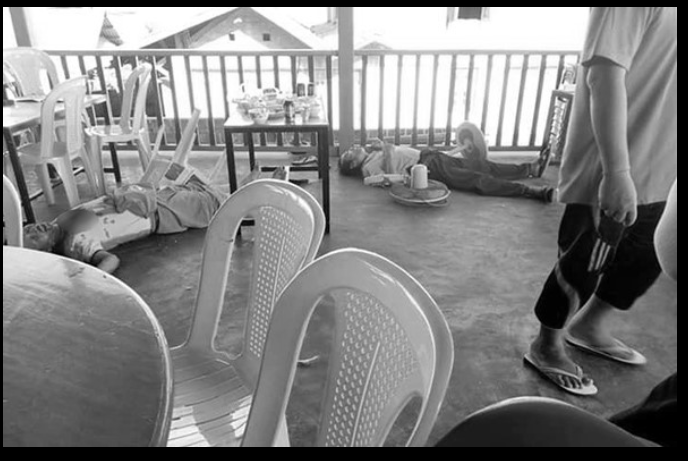On November 3 Sunday, three northern Shan State village elders, including a headman, were shot dead by unknown gunmen in Kyaukme, at Nam Khong Restaurant said to be owned by the chairman of the Nam Khong welfare society group.
Two of them were instantly gunned down on the spot, while another died in the hospital, according to the chairperson of the Zewita Social Volunteer Team, who told the Network Media Group.

The three killed were Sai Tun Yin, 36, village tract administrator of Mong Ting, Sai Aung Thein, 47, of Na Mon village, and Sai Then Han, also known as, Sai Tu Zay Ya, 52, who was a former village headman at Loi Oui.
Regarding the tragedy, on November 4, Shan Nationalities League for Democracy (SNLD) issued a three-point statement strongly condemning the terror inflicted on its three party members by the perpetrators.
It pointed out that the act is a blatant and open challenge of the country’s rule of law, as it happened in the heart of a main district town of Shan State in the middle of the day.
“The boldness of shooting in the broad day light in a restaurant, frequented by pedestrians, shows the absent of rule of law,” opined Sai Nyunt the local inhabitant of Kyaukme, echoing the SNLD statement, to the Shan Herald Agency for News (SHAN).
Similarly, the assassinations of Shan monks in Shan State, the killings of innocent civilians in Rakhine or Arakan State should not be ignored and the union and respective state governments, including security personnel, should tackle the problems with responsibility and accountability, wrote the statement.
Assassinations frequently occurred within Kyaukme area.
On 5 October 2018, Dhamma Maydani Shwe Kyin monastery abbot u Kalayana Wuntha was killed by two men who came on motorcycle; on 20 October 2019, Khur Ning abbot was assassinated by two gunmen; and a driver transporting cattle was shot dead while he was driving along the union road within Kyaukme Township, in which two cattle caretakers were also wounded.
SHAN also reported that as recently as October 15 of this year, Marn Kong village headman U Mar Koo in Lashio Township was killed by unknown gunman.
In the same vein, the culture of assassination seems to be thriving in Arakan State as more than a dozen civilians have been murdered since last December but the crimes remain unsolved as authorities say they have been unable to identify the suspects or motives.
Concerning the issue Brig-Gen Zaw Min Tun, spokesperson of the military or Tatmadaw’s true news information team told The Irrawaddy: “It has caused the deterioration of people’s socio-economic conditions. To tackle these issues and to have rule of law, we all have to cooperate.”
“[People] need to work together with the relevant security forces on counter insurgency campaigns to regain control of the territory,” he added, probably hinting at the uncooperative attitude of the Rakhine population.
Tatmadaw officers have time an again accused the Rakhine people for siding or having sympathy with the Arakan Army (AA).
The inability of the government authorities was pointed out by U Pe Than, a Lower House parliamentarian from Rakhine State’s Myebon constituency, in which he said seven killings in his constituency alone failed to identify any suspects.
“The police don’t dare to investigate these murder cases. They do not do their duty to investigate and identify the suspects. Sometimes they don’t even ask questions of people in a community who witnessed the killing,” he said.
Like in Shan State, Rakhine State also has seen many village administrators and civilians killed, which in one particular case openly left the decapitated bodies of two civilians in a highly visible area of a public market.
U Pe Than’s frustration and powerlessness were apparent, when he said: “People are too afraid to go outside and make their living. The government needs to investigate these killings and get solid evidence. This will not stop if we just say the Arakan Army killed them or the Tatmadaw killed them.”
Given such unfolding scenarios, the assassination culture in Shan and Arakan won’t be easily curtailed or resolved as the political interest conflict and ethnic conflict are intertwined and involved.
In Shan State, there is at least a tripartite conflict of interest among the Restoration Council Of Shan State (RCSS), Shan State Progress Party (SSPP) and Ta’ang National Liberation Army (TNLA), not to mention the Tatmadaw that has been clashing with all the said Ethnic Armed Organizations, including the Three Brotherhood Alliance made up of TNLA, MNDAA and the AA, in northern Shan State.
In Arakan State, it is fast becoming an ethnic armed conflict between the Arakan and the Bamar-dominated Tatmadaw.
Thus, it will be impossible only to pick up an issue of assassination to resolve it, on case by case approach, with police security and judicial mechanism, as it is a very broad societal problem that is political in nature and has to be handled as such.
In a nutshell, if we want to end this worsening political climate and tragic culture of assassination, we will have to resolve the political disagreement with political settlement, which is the only way that would be able to find a holistic and all-embracing-cure for many of our woes we are now burdened with.
And with the stagnated peace negotiation process at a standstill, the hope of curtailing the assassination culture for now will be out of reach.











Leave a Comments